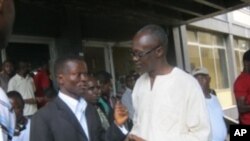The president of the Press Union of Liberia has called on President Ellen Johnson Sirleaf to lift the ban on the broadcast stations the government shut down.
The closures followed deadly clashes Monday between police and supporters of the opposition Congress for Democratic Change.
Peter Quaqua said closing the three radio and television stations has been an attempt to silence dissent and force the media into submission.
Meanwhile, government prospectors Thursday were unable to convince a court why the stations should remain closed. They requested that the court force station personnel to provide information to help them in their case.
Quaqua said keeping them closed is not in the interest of the country.
“We were in court and, as a matter of fact, [saw] the very huge presence of journalists who had assembled to show [their] solidarity. We also saw civil society people and, interestingly, some politicians, as well as students. The court requested the prosecution provide evidence. And, what was interesting to hear was that the prosecution made a request [to] the court to issue a writ to be served on the institutions to provide the evidence,” he said.
In a petition to the First Judicial Circuit Criminal Court of Montserrado County, the government said the stations “illegally used their respective media outlets to broadcast hate messages against the government and deliberately spread misinformation and messages of violence, and instigate the people to rise up and take to the streets and engage in confrontation with the Liberia National Police and the United Nations security forces.”
But, legal experts say the prosecution’s strategy to get the court to make the media institutions provide evidence amounted to asking the journalists to incriminate themselves.
“They are alleging that the [media] institutions were preaching hate messages, and they were inciting the population against the government. They said all of that. They’ve not been able to bring that to court but, instead, they are asking the court to ask the media entities to produce those materials in court,” Quaqua said.
While acknowledging the authority of the court, Quaqua called on President Sirleaf to reopen the stations because, he said, shutting them is not in the interest of the country.
“Based on what we saw in the court, it gives us reason to believe that the president needs to act. We’d like to call on the president to think very seriously about reopening of the radio and television stations so that they begin broadcasting,” he said.
Quaqua said it was in the interest of the country to have the citizens get their news and information from one media source.
“We advocate about media pluralism and diversity in the media. These institutions have been providing alternative views to the people, and I think it helps with our democratic process for people to make choices about what they listen to,” Quaqua said.
Quaqua also appealed to Liberian journalists to play what he called a stabilizing role, especially in the wake Monday’s deadly clashes between the police and CDC supporters.














